#anon you provided a THESIS STATEMENT
Note
"no hints were dropped" ok not to be that person but here are the hints that were dropped regarding Colin and Trent being gay:
1. Colin mentioning Grindr in a joke
2. Trent touching the arm of a man in the background
Here is one of the hints that Keeley was bi (even though I do believe she's been canonically bi since season 1, but not everyone sees it this way)
1. Her desktop background was in the colors of the bisexual flag
Here were some of the hints that Ted was bi:
1. Bisexual flag colored triangles above his head in the hallucination sequence
2. Inverted pink triangle next to him in that same sequence (and you can't tell me the creators didn't know, when the Homomonument is based on that symbol)
3. Countless (countless!!!) comments about men's physiques ("huge muscular thighs all caked in mud", whistling at a picture of Pep, "look at that head of hair", "he's strong", "he looks like a Rodin sculpture in cleats", etc.)
4. About a man (Higgins) and a woman (Rebecca), he had to say: "that's a crowd I don't mind being smack-dab in the middle of"
5. Him checking Trent out in the pub in 2x07 (his eyes are up there, Ted!)
6. "It could go either way", "I contain multitudes" and other comments in this vein
7. Bi lighting as he entered the Yankee Doodle Burger Barn
8. Giving similar looks to the female waitress and the male waiters in that restaurant (including a waiter in a cowboy costume that looked like he belonged in a gay club, who tipped his hat at Ted when greeting him)
9. "That's cause you were put into a box", "That box ceases to exist today", the box in the hallucination sequence breaking into triangles (as in the bi triangles and the inverted pink triangke), "we've been playing too rigid", "our guys need freedom", "fast, fluid, free, with full support", the "box that one needs to break out of" being a prominent motif in season 3
10. Wishing Beard called him pet names ("Honey, is that an ingredient or something you just called me?")
11. His crush on Pep
12. The connection between Ted and Colin: "my whole life is two lives, really", both wearing orange in Sunflowers, "I just want to kiss my fella" (Colin doesn't say "fella" , but Ted says it all the time), Ted just needs to get inspired and Colin's play is "inspirational" after he comes out, as per the commentators
And so much other stuff that, had Ted not self-identified as straight (*cough* put himself into a box *cough cough*) , you could make the case that he was canonically bi.
Here are some of hints that there was a romantic connection between Ted and Trent:
1. They hit a lot of romantic beats, and not in the jokey self-aware way in which Roy and Ted hit them in "Rainbow", but in an organic and sincere way
2. They both checked each other out: Trent checked Ted out when Ted was changing in front of him, Ted checked Trent out when Trent came up to him in a pub and hit him with a pick-up line while his date that looked a lot like Ted waited for him outside
3. Did I mention that Trent was on a date with a moustachioed man who dressed in a similar style to Ted? Let's mention it again
4. In that very bar, during a 50 second long conversation, Trent managed to say the word "love" three times. I searched the word "love" in the transcripts of the episodes. There's no other instance in which its frequency is this high
5. "Love our chats" incomplete rule of threes
6. "Sport, it's quite the metaphor" (implied: a metaphor for love; see also "love's a beautiful game" from the song Ed Sheeran wrote for Ted Lasso), "Also makes for a heck of a nickname", "Good night, Ted", "Good night, sport"
7. The soft, romantic, melancholic song playing in the background of this scene, while Ted and Trent are the last ones left in the office, with lyrics such as "When your words begin to crumble like the sidewalks all around this crummy neighborhood / From the chalky cliffs of Dover / I'd come over, I'd start over if I could"
8. Trent wearing sunflower colors in the episode "Sunflowers" and in the finale; sunflowers symbolize Ted's home (it's not subtle). He's the only character dressed like that. I'm still looking for any other explanation other than "Trent is Ted's home"
9. Their constant flirting and the way they look at each other with incredible fondness
10. The entire episode "The Strings That Bind Us". It's structured around Ted and Trent's relationship, and the way Trent changed because of Ted (in season 2, Ted defined a soulmate as someone who changes your life forever). The red string metaphor. Ted points out that soulmates are connected by a string tied to their little fingers. Ted and Trent both extend their little fingers out in similar shots. They are connected by a huge block of red in their last scene of the episode. Ted makes several comments about other men that apply to Trent ("Look at that head of hair", "Frames his face nicely", "My favorite one, he was clean shaven"). Many more details that lead back to Ted and Trent: Nate tells the restaurant owner to tell Jade he said "Hello". Immediately after, Ted and Trent say "Hello" to each other. The map that Nate's father used to ask out his mom has the number 1.3 written on it and an illustration of two people at a table in a restaurant. Ted and Trent went to a restaurant together in season 1, episode 3. The last scene of the episode mimics a "Race for Love" scene from a romcom, with Trent chasing after Ted. Trent also does not say a word to anyone other than Ted in the entire episode. He is completely focused on Ted
11. "Trent, what do you love? Is it writing?" and Trent ends up writing a book about Ted and naming the manuscript after Ted and he only cares about Ted's opinion on it (he leaves the room when Beard starts reading, but stays in the office after hours just to watch Ted read. "I just wanted you to like it.")
11. Trent's crush on Ted, confirmed by Jimmy Lance (and also obvious in the show, if you ask me)
Now, why would I believe that none of these hints were intentional? Maybe some could be explained away, but all of them? The hints we got for Colin, Trent and Keeley were so much smaller than this, and those turned out to be intentional.
anon i wish i could offer you the response you deserve, but i cannot stop rereading this masterpiece & focusing on the portions of evidence you provided that i didn't even pick up on until you laid them out. holy shit
#IM LOSING MY MIND????? HOLY SHIT#anon you provided a THESIS STATEMENT#kissing you on the forehead & sending you flowers & baking your favorite bread#ted lasso#tedtrent#tedependent#trent crimm#there's also the casablanca references between them#& the way in amsterdam trent says there's a van gogh museum night. and where does ted wind up? at the van gogh museum looking at sunflowers#their arcs are foils too. both got divorced around the same time. both have one kid (ted has a boy and trent has a girl)#trent left his wife meanwhile michelle left ted#trent is happier post-divorce meanwhile ted struggles with the loss#there's the wizard of oz motif too and who wears red shoes? trent. it's subtle but he wears what look like red heeled shoes#speaking of shoes....the cheetah print motif is also present with trent#'hes our dork' and ted's fond gaze as he watches trent disappear#there's SO MUCH there dude SO MUCH
173 notes
·
View notes
Text
God Is a Creepy-Ass Meta Mfer:
A Good Omens Essay
This essay features fan theory and speculation. DO NOT TAG NEIL GAIMAN IN ANY POST THAT INCLUDES OR REFERENCES THIS ONE.
The rest of this depends on accepting the premise that God's Plan is not always inscrutable in hindsight, i.e., that parts of that Plan can be discerned or identified as such once they have happened, even if the next moves of the Plan and its ultimate Purpose remain ineffable.
If you are willing to accept that premise, then I suggest we can conclude with reasonable certainty that Thesis Statement 1: Aziraphale's act of giving Adam the First Man the flaming sword is part of God's Plan, and so was Eve and Adam eating the Fruit.
The argument for the latter has been in circulation making even the beardiest of old Christian men scratch their heads for centuries, and in Good Omens, Crowley is the first being ever to make it:
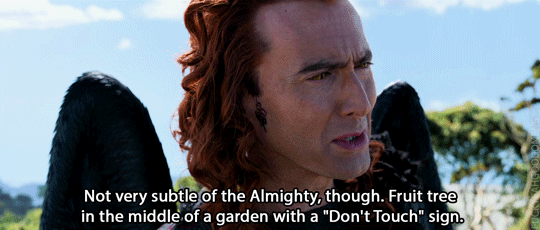
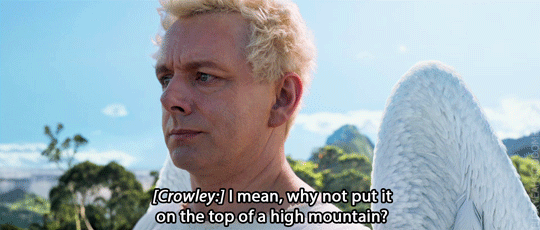
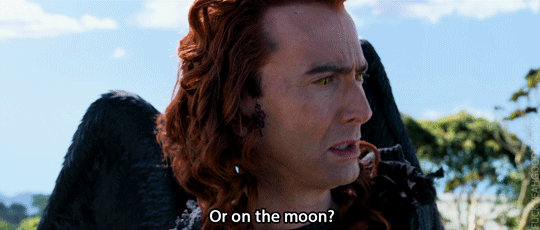
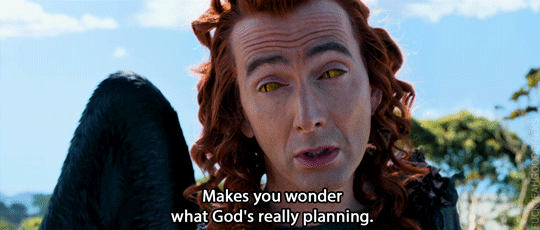
The presence of the Tree in the Garden placed by an omnipotent being with literally infinite orchard space and security technology is a clear indication that God intends humans to interact with the Tree and sets humans up in a divine entrapment operation, giving God the opportunity to curse humanity and evict them from the Garden.
Diversion onto Thesis Statement 2 bc the Essayist Got Distracted: This establishes both the Bible and Good Omens as works of literature in the cosmic horror genre (not that Good Omens doesn't do plenty of its own work in so establishing itself).
In both these stories God is a being beyond humanity's understanding, functionally omniscient and omnipotent, who first creates and then interferes with humanity for unknown reasons and who does not necessarily have humanity's best interests in mind at any point. His/er reasoning and objectives for humanity are opaque, and S/he manipulates circumstances to create excuses to do humanity as a species and sometimes specific humans harm.
If you're not already familiar, go read all the shit God curses humans with when Eve and Adam snack on the Tree's Fruit. It's frighteningly cruel, if not outright psychopathic. So is God's behavior the Book of Job, His demand that Abraham sacrifice Isaac, Mosaic Law, and the sacrifice of His/er Son. Human lives are no more significant to God than the lives of ants are to humans. This whole history of Earth? It may not even be about us. Our entire species' history may just be part of the backdrop to something else, like two angels falling in love and reuniting Heaven and Hell, or like raccoons. It could all be about the raccoons. Who knows! All of this is absolutely 100% pure undiluted cosmic horror.
Right, okay, so back to Thesis 1: In Good Omens, Aziraphale's gift to the first man of the flaming sword is an objective God wants. Here's my chain of reasoning:
The Eating of the Fruit and God's punishment were both objectives of God. See above.
2. Once those objectives had been accomplished, humankind would not have survived outside the Garden of Eden without the sword. They literally would not exist at all.


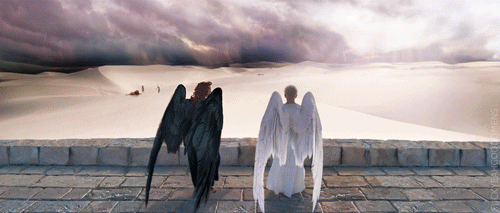
Adam the First has to kill the lion, either to keep it from killing him and Eve or to keep him and Eve from starving. No flaming sword = no humanity.
3. We know "no humanity" is not God's Plan, because--
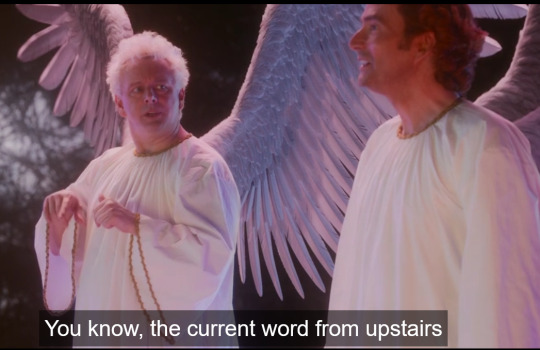
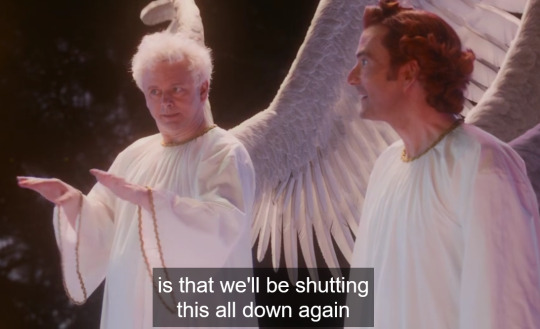
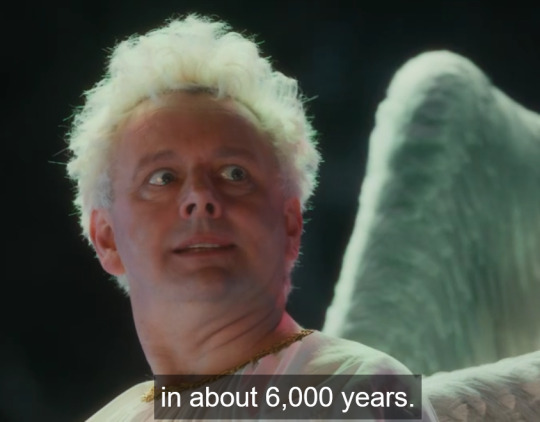
--God says her Plan is Armageddon and the Second Coming in 6,000 years. So humanity needs to exist for either of those to occur (or for there to be any reason for adventures about averting them to occur). And God does a whole Crucifixion and Resurrection of His/er Son. So God wants humanity around and is even prepared to welcome them back into His/er grace, providing they meet certain conditions.
4. We know God is not displeased about Aziraphale's gift of the sword to humans because God asks Aziraphale about the sword, and Aziraphale lies and says he's lost it, and God, who is omniscient and therefore knows this to be a lie and knows exactly where the sword is, lets the entire thing pass unremarked. (More on this anon.)
5. It is not a reach too far to suspect this of God. She tells us Herself that she is a trickster and that we can't trust her not to deceive us:
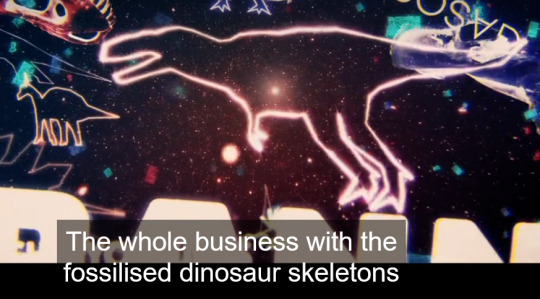

She also tells us
i. The universe is a game she is playing for her own amusement:
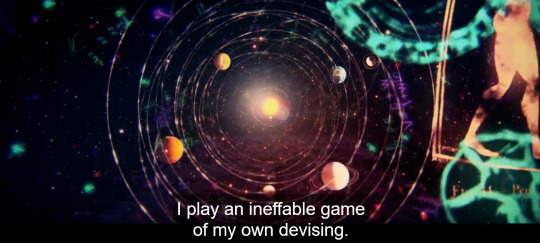
🎵cosmic horror alerrrrrrrrrt!🎵🎶
ii. No one, including angels and demons, has been told the real rules of this game:

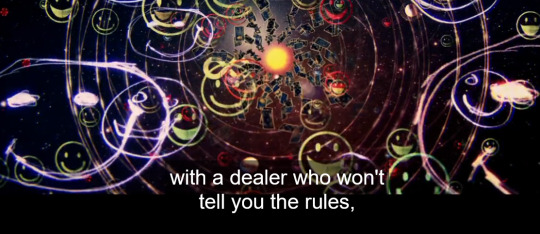
"FOR EVERYONE ELSE." Not just humans.
That's why Crowley and Aziraphale each have to wonder if they've done the right or the wrong thing: nobody's told them what the rules are. Aziraphale even thinks that Crowley's temptation of Eve is "all part of the Plan," i.e, that Crowley did the right thing by doing the wrong one. They have no way to tell, and it may be both right and wrong at the same time. (Wrestling with impossible moral conundra raised by a brief look into a story happening on a much greater level than your own? You could be suffering from our old pal Thesis 2: Good Omens is cosmic horror!)
So Aziraphale's Promethean gift to humanity was one of God's objectives, just as cursing humans and yeeting them out of the Garden with the knowledge of Good and Evil and maybe a couple apple seeds in hand was His/er objective.
BONUS! Thesis 3: So why does God bring up Aziraphale's misappropriation of the sword at all? To show us, the audience, that Aziraphale lied to Her and that his gifting of the sword to Adam is part of Her Plan.
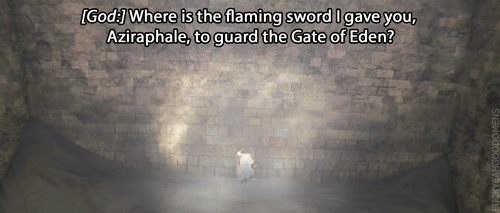
Remember from her whole deal with the Tree: God likes to set up situations so that She can react to them. Here she lampshades her awareness of what Aziraphale has done, listens to him lie to Her about it, and then very pointedly does nothing in response to that. She wants everyone watching--i.e., Aziraphale and us--to note that she has noticed the transfer of the sword and is not displeased by it and has noticed the lie and is not going to do anything about that either.
Remember as well, God is the one controlling the narrative we see in S1 of Good Omens. She introduces and concludes the story, and she narrates the scenes of the baby-swap. She's in control of which scenes we see and the order in which we see them. Since she is the one who asked Aziraphale the question about the sword, she's also responsible for this scene's existence.
So why do I think this scene is meant for us and not Aziraphale? Two reasons. Firstly, the conversation with God doesn't do Aziraphale any good. He worries about eventually getting in trouble about the sword until 2019, around 6,000 years later.
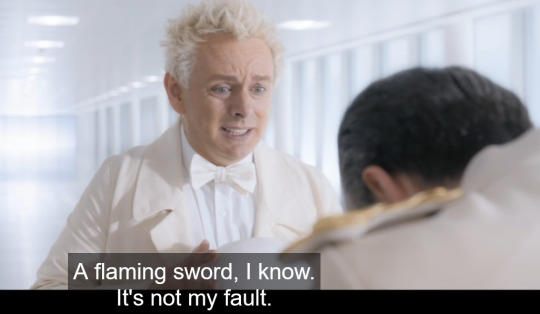
God is both omniscient and omnipotent, so it's not possible that She failed to communicate to Aziraphale in such a way that would ease his anxiety. Therefore the conversation was not for his benefit. Again, she's omniscient, so it wasn't for Her benefit either. That leaves the only other party to this conversation: us. The audience.

The next obvious question is, Why does God want us to know that Aziraphale's gift of the flaming sword was both of his free will and part of Her Plan?
I don't know. But I think it may become important, and here is where we delve into hypothesis territory: I think Good Omens is going metafictional. I mean this in a Doki Doki Literature Club, Black Mirror: Bandersnatch way: God, the character in Good Omens, is telling us, the audience, a story.
This metafictional aspect has been with us the whole time---more precisely since 01:13 of S1E1, when God switches from third-person to first-person and addresses us the viewers directly:

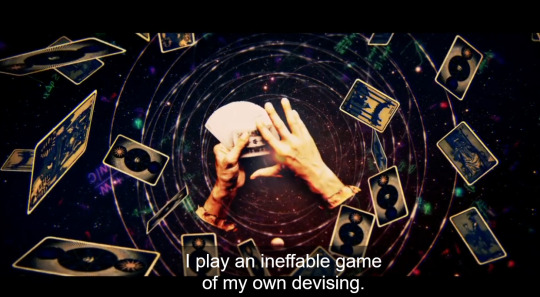
And there are several more metafictional; notes in S1 and S2 that I've found so far:
Season 1
That giant eyeball up there floating in space with a bunch of arcane shit around it is a reference to the opening credits sequence of The Twilight Zone, a metafictional show in which an omniscient narrator introduces and concludes each story by addressing the audience directly.
S1E1 27:20
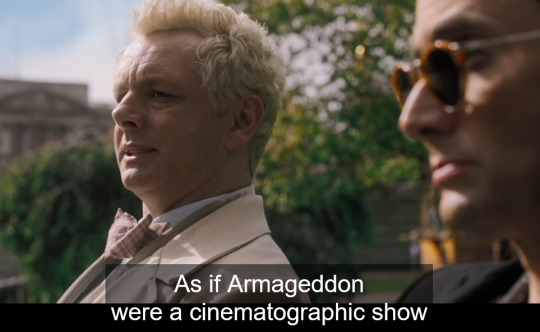
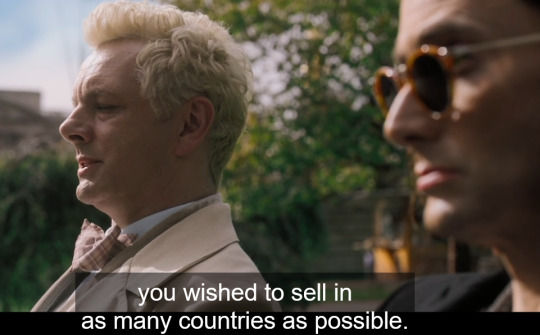
Season 2
1. Maggie and Nina are fictional characters, but the characters share their names with actors Maggie Service and Nina Sosanya.
2. The final credits sequence, with the split screen showing Crowley on one side and Aziraphale on the other, references David Tennant and Michael Sheen's previous/simultaneous lockdown tv series project, Staged! which is intensely metafictional and in which Tennant and Sheen play characters based on themselves and with their names.
3. Sloppy plot synopsis or something more sinister?
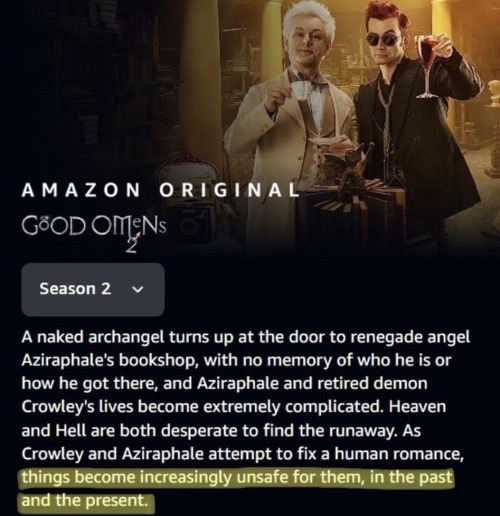
4. An interviewer points out that Good Omens references Doctor Who as an extant concern in-universe, which obviously stars David Tennant in the past and currently.
If you find more, please drop them in the comments!
We the audience, are meant to understand ourselves and our reality as being indirectly involved in this story. And God wants us to know 1) that Aziraphale lied to Her about giving away the sword, knowing it was futile, and 2) that his gift of the flaming sword was part of Her Plan. The former is a major character note, and probably a foreshadowing one; but I have no guesses about God's purpose in showing us that the gift of the flaming sword was also to Plan except that whatever it is will probably make me dislike Her approach to parenting even more than I already do.
What I do love about this though is that it suggests that Crowley and Aziraphale both did the right thing by doing the wrong one, i.e. achieved a kind of Schroedinger's obedience, which is nice and disturbing and surprise! pretty cosmic horror. More sweetly, though, it suggests that the two foundational gifts to humanity from the divine were motivated by Crowley's low-effort mischief and Aziraphale's kindheartedness, which is lovely to think about.
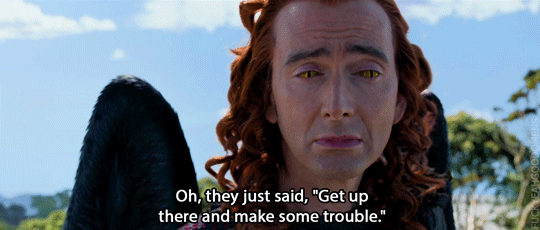
DO NOT TAG NEIL GAIMAN IN ANY POST THAT INCLUDES OR REFERENCES THIS ESSAY.
#good omens#good omens s2#good omens god#good omens metafiction#good omens cosmic horror#good omens flaming sword
178 notes
·
View notes
Note
Now that we've officially entered TTPD release month and still have minimal info about the album itself somehow...what's your current predictions about what the album is gonna sound like and what it's central theme will be? (Sorry in advance if you've already covered this recently and I missed it lol)
My guess is that it will be Midnights production with Folkmore's lyrics and the theme will be reevaluating long-harbored misconceptions about love i.e. the sharper edges of 'fairytale romances' and overcoming deep wounds that you once thought you deserved to get etc...very Red adjacent if you know what I mean.
Anyways, your(And your other anons) big brain analysis always intrigues me so I was wondering what's your thoughts on all this and why Taylor is insisting on maintaining such thick air of mystery around this project as of yet.
i don't know about production or sound - i just hope florence and her chamber pop had an influence, because i love it very much.
i have all my song-by-song predictions pinned to my blog if you want to take a look.
but overall, based on the statement we received so far (which i assume is part of the prologue, or the thesis of the album), it sounds like this will be her "defense." the whole story. the good, the bad, and the ugly. but not just the story with joe, but a statement defining her perception of her role as an artist/truth-teller.
for our evidence, she is providing:
her tarnished shield, implying she's seen a lot of conflict, but also the tarnished symbol of her family (it makes me think of the shield she created in lover and repurposed for every album since. a literal symbol of the family she was creating?)
her muses, and the pain that her lovers caused her, that she caused herself in pursuit of relationships/acceptance, and the pain of her art being used as a weapon against her (ie, "with every guitar string scar on her hand" meets "watch out dude she'll write a song about you.')
her talismans and charms, and the many way she tried to control or protect herself and her relationships (reminds me of "i'm the wind in our free-flowing sails and the liquor in our cocktails" and "wary of ... charmers, dandies and get-love-quick-schemes.")
the love bombs and this sense of foreboding, evidence that there was intent to harm.
her veins of ink - like they're running black/dark, but also, she's a songwriter, it's her life blood, and it's ink, permanent, the way a record permanently goes into the public consciousness
all's fair in love and poetry - there's no right or wrong in this kind of conflict. it implies war (all's fair in love and war), truth (as in her truth but also the honesty of art), and also a lack of remorse. i mean, why should she feel sorry? it's her art. it's love. there are no rules.
the chairman of ttpd - time to teach some lessons.
26 notes
·
View notes
Note
ciara....LOVE ME ANYWAY scene....it gets me everytime...the vulnerability in buck's voice like he's a child again, begging for love???? i just-- cinematic masterpiece
god i know!!!! anon, i was literally only thinking about it again today like??? it truly is his character's thesis statement. everything about who buck is, his entire character arc, culminates in that one scene and specifically that line.
i don't think i'll ever be over how succinctly the 4x04/4x05 plot provides you with an explanation for every single choice buck has made in the 3 seasons previous. it was genius storytelling.
and that line!!!!!! ugh i think what really gets to me is the way it almost sounds disbelieving?? like he can't actually believe he has to explain to his parents that they were supposed to love him regardless of their own grief and regardless of the ways he "never made it easy" for them.
and yet at the same time, it absolutely is a moment of realisation for him - like he finally sees that there's nothing he could've said or done, nothing or he could've changed because at the end of the day he'd always end up here: begging for their love and getting nothing back.
there is an entire life time worth of pain in that line and i will personally make an award for oliver stark to make up for the fact he didn't get one for it
33 notes
·
View notes
Note
Hey, I hope you’ve been alright. I’m so bummed about Jancy not have any scenes together this season. The fact that they are pushing Stancy doesn’t make it better
Anon, I am with you totally and completely - bummed doesn't seem to quite cover it, it's worse than bummed. However, I stand by my call that episode 1 is a thesis statement for the entire season (see: Will's 'we'll fix it together'), and what features in episode 1? A scene that lays out exactly how Jonathan and Nancy 1) completely know and understand each other and, 2) declare decisively WHY they are, 3) in love with each other.
Is there a small part of me that worries they'll break up at the end of the season, due to all the St*ncy pushing? Of course there is. (Or due to Nancy going to EARLY DECISION to Emerson, of all places. EMERSON. Am I biased because I have a History with people from Emerson? Maybe?? I digress.) Or is it all there because even I will admit, Steve and Nancy got zero closure, and it's there to provide a comparison to when an actual loving, caring relationship shows up? (That is obviously having some miscommunication problems due to distance, but that will all be resolved when El figures out Upside Down Fast Travel.)
But they will (had better) have scenes with each other in the next (ugh, $25 million an episode and you couldn't hire a competent editor?) five hours of the season, and hopefully there will be some desperate clinging, and monster hunting, and knowing each other, and TALKING TO EACH OTHER and more of that love we (and they) know is there. It's what I'm clinging to, at least.
2 notes
·
View notes
Note
hey Lena, feel free to ignore but;
I read your “nerd lectures” when you posted them and I literally couldn’t stop thinking about them, even months later! I explained to my friends the vampires and zombies depictions and they’re meanings, and we all thought it was awesome, so I wanted to take the time to say thank you for doing that.
I am curious, though. When you stated that our current fears are reflected on today’s media, would you be willing to expand on this/provide examples? I think it’s so interesting!
Hi anon, thank you so much for your kind words, I'm so glad you enjoyed my little lectures, haha! Vampires and zombies are here, if anyone else is interested in reading my talks on those!
So my running thesis is that most horror media constantly reflects its society and audience's current cultural fears, in some way. (Kind of feels like a no-brainer when I put it that way, but to be honest, a lot of academic waffling can...) I was teaching my class around 2014-2017, so a lot of my examples are a little dated, especially since our most prominent anxieties can shift so quickly (and especially so in the last few years). I'm also not as up-to-date with what's airing and what's popular today as I was back then, so take what I say with a huge grain of salt! This is all sort of just my own interpretation and by no means a broad statement on "society's fears": I can't presume to accurately know such a large, nuanced, variable concept as just one person, but I do think it's fun to analyze popular trends with that sort of lens!
So the 90s to 2000s saw this really interesting shift where blockbuster movies and shows were repurposing and reframing traditional monsters and villains into protagonists and sympathetic characters. Aliens were no longer just the terrifying Xenomorphs stalking Ripley through the bowels of a spaceship, intent on ripping her away from her adoptive daughter: they were also E.T., a friendly foreigner being pursued by a sinister government intent on detaining him and preventing him from returning home (or acclimating to a new one). The dinosaurs in Jurassic Park weren't the true villains; it was the greed and carelessness of the Ingen corporation and Dennis Nedry, whose gluttony and avarice let them out: the "monsters" here were innocent, only let loose to do as nature intended them to do by the negligence and callousness of capitalism. Vampires were no longer blood-sucking ghouls representing antiquarian fears of sexuality and sensuousness: as our society's values shifted, vampires then became embraced as objects of desire (Twilight, True Blood), figures of sympathy and even comedy (What We Do in the Shadows, Let the Right One In), or alluring fantasies about attaining power and superhuman abilities when confronted with the fragility of human life. Even zombies underwent their own axis shift (Warm Bodies, iZombie), and in most zombie narratives of today, the ringing statement tends to be: It's not the zombies you should fear, it's the people around you, the selfish horror and inventive cruelties that only humans can create when trapped in desperate, cannibalistic systems. (Train to Busan, The Last of Us--even the Walking Dead's tagline for a long time was "Fight the Dead, Fear the Living.")*
So if traditional monsters were sort of shifting into these greyer areas and were no longer reliable hallmarks for our current fears, the question had to be asked: who are the actual villainous forces of today's horror media, and what do they represent? Pick the most popular shows and movies from the last five years that you think of when you hear "horror," and you can sort of start to pick things apart through that lens.
Back in 2016, I had a few bullet points that I could reliably point to when watching most any horror movie or show. At that time, the big hitters were:
The true horror is the government, not the monster you think it is. This anxiety and mistrust of the government (at least in the US) has been exponentially increasing since 9/11 (whereas much of our media in the 90s and before was extremely patriotic and more fearful of foreign governments, the Soviet Union, foreign spies in our midst (Invasion of the Body Snatchers), etc.); and you can see that fear and criticism really ramp up through the horror media that's come out since then; whereas the government (or its extension, the police) was once the authority that you waited for to come save the day at the end of the movie, it has now become the cause of much of the horrors that people are dealing with in our stories of today (Stranger Things, Super 8, The Host, etc.). See also movies like The Purge: Election Year, which came out in 2016. You can put it together...
There were also a lot of preoccupations with social media, the isolation or terrors of the Internet, and its effects on people as a cause for horror and anxiety back then: this was when things like Unfriend, Black Mirror, Creep, and Searching were hitting the peak of their popularity.
Another common theme that year was not being able to trust the people you think you can trust or the people you think you know well: It Follows (sexual partners), The Boy (employers), The VVitch (family), The Invitation (friends/ex-spouse), The Gift (husband of many years), etc. Each of these featured their own specific monster that wasn't any of the above things; but the protagonists were only put in those terrifying positions by the people they thought they could trust, who explicitly went out of their way to let them down or fuck them over. I think this indicated a general wariness and anxiety about traditional authority figures (if you can’t trust your loved ones to protect you, how can you trust large-scale institutions?), or that secrets, betrayals, and scandals were more on the cultural forefront that year (this was right before #MeToo)—but I’m not as sure on this one (or it’s not as clear to me) as the other themes. Could also have just been a coincidence!
Since then, I think some of those trends have remained consistent, but I've also noticed a sharp uptick in horror movies that explore or reflect extremely prominent anxieties regarding mental illness (Lights Out, Split, Hereditary, Midsommar, The Babadook, The Blackcoat's Daughter, They Look Like People, I'm pretty sure Malignant but I haven't seen it, etc.). I'm not saying I condone any of those depictions, or the vilification or demonization of mental illness, because a lot of those depictions mentioned are very damaging and harmful; but they (and their critical or financial success) do seem to reflect certain anxieties that we as a society are becoming more preoccupied with—they’re clearly resonating with audiences in some way—so they support my "thesis" that that's what horror films are the vehicle for. I've also noticed a comeback in religious and cult horror (The Nun, The Ritual, Midsommar, Midnight Mass, Yellowjackets, The Society), obviously more emerging films about race and the horrors of white abuse and racism (Get Out, Us, Lovecraft Country, Them), as well as explorations of addiction (Killing of a Sacred Deer, Haunting of Hill House, Midnight Mass).
I definitely think the anxieties of 'being trapped in a household/confined space with people you come to find you don't know as well as you think or can't trust' are on the rise in media, and will likely spike for a little while post-COVID, unless the market is already saturated with such stories (The VVitch, The Lighthouse, Bird Box, His House, Don't Breathe, It Comes at Night, Head Count, etc.; Night House (2021) is also a perfect example for this).
So, uh, yeah! That's my ultra mini-condensed version of some of the stuff we were talking about in class! TL;DR - you can really interpret any number of things from trends in today’s horror media: just look for the narrative patterns or common threads between popular horror entries, and what’s selling well or talked about a lot, and you’ve probably found a cultural vein that these movies and shows are tapping into, either subconsciously (because the filmmakers are, of course, just as influenced by the anxieties of the times as their audiences) or purposefully.
I hope that was an interesting read, and thanks for your kind words and question!
*If you want to follow another really fascinating thread, think also of how zombies have also somewhat evolved from the slow, shambling dead of the Romero era to the violent, aggressive, running zombies of much of today's zombie media. Arguably this was kickstarted and popularized by Danny Boyle's 28 Days Later, in which people are infected with an incredibly contagious disease called Rage that takes over the entire country in less than a month and incites entire populations to insane violence and infighting--and this released in 2002, one year after 9/11.
#nerd lecture#spoilers#horror#horror media#tw: abuse#tw: racism#tw: 9/11#tw: addiction#tw: mental illness#tw: cult mention
56 notes
·
View notes
Note
hi! just saw your post
may i ask how do u write literature review??? it would really help for my research paper
thanks sweetie
Hi anon! Here is the guide we were given by our dissertation supervisor:
Summary of Topic - Give a brief overview of your chosen field. Determine what has already been written and identify gaps in research that your work will address.
Thesis Statement - Present your thesis statement and identify the trend you are going to examine.
General Information - Provide an overview of your first theme, discuss the way it emerges in your chosen field, and discuss relevant texts as reference. Identify strengths and weaknesses in the research, any gaps in research, or any conflicting evidence. Continue citing facts of your primary theme.
Conclusion - Wrap up your discussion, and also point out some of the strengths and weaknesses of the literature and texts you examined.
Our review had to be about 800 words long, but you can write as many body paragraphs as you need to discuss your point.
Good luck with your paper!
56 notes
·
View notes
Note
what a bitch
score: 1/10
Hi anon!
First, I appreciate the effort, but I think you can do better. I like your thesis statement overall, but where is the supporting evidence? Where are the details? "Bitch" is also so vague---be more specific! In what way am I a bitch?
More importantly, know your audience! This is where you'll have to do some research. "Bitch" doesn't offend me. What insults would I take offense to? I won't provide you those---it'll be more meaningful for you to figure it out on your own!---but a good place to start is to skim through my blog and get a sense of the person I am. (Which is, of course, a proud bitch.)
This is my first anon hate ever, and I have to say that I'm pretty disappointed. We can do better. If you resubmit after making these changes, I'll take another look. I don't want to fail you.
Let me know if you have any questions or concerns.
(ask game? send me anon hate and I will critique it 😘)
6 notes
·
View notes
Text
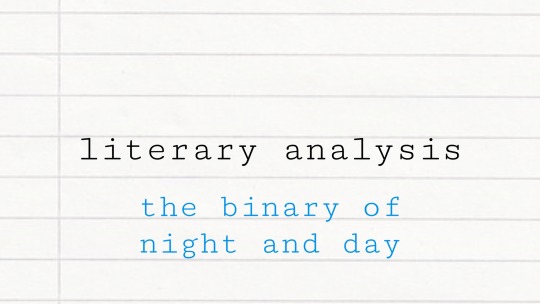
y’all know I can’t control myself when shinee loving anon encourages me to do literary analysis! here are nearly 2,000 words of me analyzing my own writing like a weirdo :p because this is not the first time I have done literary alaysis of my own work, and it certainly won’t be the last (I’m already working on a thesis statement that could connect themes from the SHINee universe to at least 2/3 main plots of For You), I’ve decided to make a little banner for these essays lol.
First, some disclaimers: For You is an ongoing work. It might be an ongoing work for the rest of forever because Lei provides a perfect character through which I can explore S.M. In case you haven’t gathered from scrolling through my blog for a few seconds — I am a huge S.M. fan. With that being said, the main plot of 4 O’Clock is completed. This informal essay will discuss similarities between 4 O’Clock and works in the SHINee Universe.
I think I should begin by expressing my deep attachment to Taemin that is reflected in my writing. He is the first SHINee member that I wrote about; that drabble resulted in my friendship with SHINee Loving Anon and inspired my confidence to write about all five SHINee members. “Beautiful Parts” should be read as what it is: my reunion with my favorite group. Writing that story was therapeutic; it ranks with “Between Souls - Jonghyun,” “Lights - Taeyeon,” and “Orenda - Onew.” All of these works were written with my emotional needs in mind. They are deeply personal, and that’s why I love them. I created them with the intent of bringing myself comfort, and I shared them with the hope of extending that comfort to others.
“Beautiful Parts” also represents the shift toward Taemin becoming one of my ultimate idols and creative inspirations. When I could not yet write about Jonghyun, I could write about Taemin; when I could not yet listen to Jonghyun or SHINee without hurting, I could listen to Taemin. The image that I created of Taemin comforting someone — an unnamed reader — in “Beautiful Parts” remains with me. I can’t unsee it. It is obviously not a moment that I have lived through, but it feels real to me.
That image is integral to the relationship between Taemin and Lei. Comfort — the fact that Taemin sat beside her when she cried — is a key component of Lei’s love for him.
One could and should find similarities between the unnamed character of “Beautiful Parts” and Lei. Granted, “Beautiful Parts” is a part of the SHINee Universe. The character is Minho’s sister; although much of her character is intentionally vague, she is a separate character from Lei. She could and should, however, be read as a precursor to Lei. Both characters seek the company of the moon when they are troubled and cannot sleep. They share a desire — a compulsion, even — to reach for the moon and stars that they know they can never reach.
“What’s so comforting about the moon and the single star in the sky? How can they be so far, lightyears away, yet feel so close? Why did they convince you to lean against the railing, reaching for them like a child with no understanding of the distance? You couldn’t say, even though you wondered almost every night.” “Beautiful Parts”
“The stars were on full display, and the moon was a sterling crescent so bright that I thought, were my wrists not bound, I could have reached out and grabbed it out of the sky and put it in my pocket.
That was a silly thought I dreamt about often: holding the moon, carrying it around with me in the daylight as if I could protect it better than the sky. I don't know who planted that dream in my mind or why, but I was always grateful for it" (4 O'Clock, Chapter 2).
If you read 4 O'Clock, you cannot mistake the significance of the moon; Lei will not let you. In third-person or second-person narratives— like "Beautiful Parts"— I think that it would cheapen the story to overtly impress upon the reader the significance of a symbol. Put simply: if the second- or third-person narrator has to explain, "this is significant because," then the writer has failed in their application or execution of a symbol. However, as Lei is a first-person narrator relating her story to her mother, she is permitted to express plainly, "this is important— this is important, and this is why." She does exactly that by referring to the moon, in later chapters, as "our moon," meaning that she has claimed this symbol as hers and Taemin's.
This claim of ownership becomes especially significant as Lei struggles to confine her love for Taemin to times when it is safe to express— at night in their hotel room or, in post-tour chapters, in her room. This distinction is also expressed in "Beautiful parts" compared to its counterpart "Morning Confessions." I used "Morning Confession" as a guide in writing the morning scenes of 4 O'Clock Chapter 9, Chapter 12, Chapter 14, and part 6 of the Epilogue. In all of these scenes referenced, there is a clear shift between the night— when a character receives comfort— and the morning— when that comfort is reciprocated, usually through some form of affection.
The exception is the scene from Chapter 9. This part of the story occurs before the New Year's kiss that dispels much of Lei's discomfort about being in a relationship. Within this scene, Lei is torn between the desire to share her first kiss with Taemin and the desire to escape his embrace and start her day. Notice, then, that Lei is imposing this binary of day and night. (Granted, Lei believes that this binary is imposed upon her by external forces. I am inclined to agree that she is limited in self-expression by the pressures of standing in the public eye. Using my author knowledge of her life, I would also argue that her fears and reservations are rooted in real-life experiences; those are always the hardest fears to shake.)
Another interesting observation is that this scene from Chapter 9 is sandwiched between Lei's comforting Taemin post-Jaemin-induced-tantrum and the tense bathroom scene where Lei object to the terms "mine" and "yours" when referring to another person.
"That's something I've always struggled to accept: the idea of calling somebody— a whole individual— mine. I know some people are infatuated with the idea of ownership, but that kind of dynamic has always made my skin crawl."
"It's just, those words— mine and yours—" I cringed, and Taemin dropped my hands. "I don't know. I think it's fine to call you my soulmate or my boyfriend, if that's what you are, but the thought of calling you— all of you— mine just seems wrong'" (4 O'Clock, Chapter 9).
Note: Lei does not yet accept that Taemin is her soulmate. These quotes are indicative of Lei's character as they express her deepest fears. Consider that 4 O'Clock— while it is about Lei's love for Taemin, and it is about Donghae's unrequited (totally requited) love for Manager Kim— is ultimately about Lei's liberation from fear. Certainly, Taemin places a role in that liberation; Lei states far too many times to reference that he was an inspiration to her before she knew him as anything more than an idol. However, one would be remiss in failing to recognize the relationship through which Lei discovers herself: her relationship with her mother.
(If you need proof of this claim, and I seriously doubt you do, here is a quote from Chapter 10:
"I had been considering what it meant to be the fulfillment of her dreams, and it meant that I couldn’t be afraid. It meant I didn’t have to be. There was liberation in the fact that I could be confident in the truth that no matter what anybody in that hotel room, in the country, in the whole world even (!) said or thought or did, I now knew who I was. I knew who Mom was. I knew that no matter what— come what may— we would love each other forever.
All along, I had the forever love I couldn’t admit to wanting. . .")
The whole "'mine' and 'yours' makes me cringe" scene occurs right before Lei admits to her mother that she knows who she is: the idol who never debuted. Throughout most of the story, Lei refers to her mother as "Mom," capital-M, as if "Mom" is her birth name. There are scattered incidents where Lei writes "my mom," but she usually does so to distinguish her relationship with Mom and the one Lucas claims by using the name.
"Were I not used to that— Lucas referring to my mother as if she were also his, calling her hot— I might have cringed" (4 O'Clock, Chapter 1).
This use of the phrase "my mother" should be viewed in contrast to Lei's use of the phrase "my mom" in chapter 9.
"No. No, I knew my mom. I knew her long before I saw her as the idol who never debuted. She had eyes that found possibilities where others saw none. There was no way that she hadn't considered how the last 21 years of her life had been affected by my existence" (4 O’Clock, Chapter 9).
By using the word "my," Lei does not take ownership of the relationship— or of her mother as a whole individual— in a way that should make anybody's skin crawl. Rather, she uses that word to distinguish her Mom from the idol who never debuted. "My" is a protective word— a word through which Lei can shield her mother from judgment. Distinction of identities matters deeply to Lei because she feels that she is inadequate in her roles as an idol and as a human being.
She writes when reflecting on Kai's request to be called Jongin that she has always been hyper-sensitive to the difference between calling an artist by their stage name and their birth name. Considering whether she should have used a stage name herself, Lei wonders:
"Would that have made it easier to distinguish me (the person) from me (the idol)?" (4 O’Clock, Chapter 2).
It is crucial to understand these distinctions of identities and their significance to Lei if you are to feel the weight of a post-New Year's- Kiss moment:
"That time, when Taemin whispered, “My Lei,” against my skin, I didn’t cringe at the thought that I— all of me, every thought locked away in my mind, every fear hidden in the darkest corners of my heart— belonged to him.
Maybe that’s not the best way to phrase it. Maybe I mean to say that I didn’t cringe at the thought that all of me, even the parts that I considered fruitless or dangerous or flawed, belonged with Taemin. I don’t know" (4 O’Clock, Chapter 14)."
There's our Lei, still caught up in things like proper wording! Also significant is Lei's limited use of the phrase "my Taemin." She thinks it for the first time shortly before the scene quoted above; she doesn't say it aloud until the next day. We could take this, I suppose, as another example of the binary of day and night that culminates in Lei's decision to "live in the light," expressed in the closing chapters.
8 notes
·
View notes
Note
I don't think the previous anon was demanding you fact check for them though? Maybe it was poorly worded, but it sounded more like they were asking if you already knew about the validity of the video? Like I totally understand not wanting to be treated like a free service, and I know you get a lot of shit from a lot of people (probably a lot more than your followers see), but sometimes you call people out for being rude/demanding when it really doesn't seem like they were being such?
I think you’d be very much putting words into someone’s mouth if you said ‘Biographics on YouTube have posted a video "Hatshepsut: Queen of the Nile", is it actually factually accurate?’ actually means ‘hey have you already seen this video and can you tell me if it’s accurate?’ because they do not explicitly say that. If they had said that, then I would have said ‘no I haven’t seen it’ and moved on. The question at its core is, in fact, ‘there is a video. Is it accurate?’
However, I took the question at face value (since it is me the question is being directed at, my interpretation of the question is what you’re going to get); that being: a) anon has seen a video on youtube and b) wants to know if it’s accurate (i.e. can you tell me if the information in the video is right or not?). If you say ‘there’s this video and I’m wondering about the validity’ I can’t ascertain the validity unless I have watched said video, no? Therefore, the onus and expectation is on me to watch that video in order to answer the question.
For the record, I don’t believe that anon was being either rude or intentionally demanding of me. However, anon, like a lot of people who message me, do so with language that is unintentionally, yet explicitly, expectatious. Instead of saying ‘hey I saw this and I’m wondering if you could watch it and see if it’s right? Thanks!’ it’s ‘there’s a video, is it right?’ which creates the expectation that I will take time out of my day to watch a video (of which I have no idea of the length until I look it up) and write a post on whether it’s factual or not. It was an underlying expectation that if I hadn’t seen the video, then I would watch the video and provide the answer regardless.
This is true of a lot of asks I get on this site. Instead of ‘please’, ‘thank you’, or ‘if you’ve got time I’d really like to hear about...’ (though a handful of people do do this), I get ‘tell us about’, ‘give your opinion on’, ‘tell us if is this right?’ or ‘look at this book/article/video and give an opinion/fact check’ which is impolite and expectatious. The first lot of addresses treats me as if I’m a human being who is doing this because she loves it and is appreciative of the time taken. The second lot of addresses is more how you’d treat a search engine. Input question, get data. It does not expect, nor anticipate, a ‘no’ response, it expects information to be provided. My doctoral thesis was in part a discussion on the use of impoliteness within Egyptian legal texts, for which I had to do an in depth study on politeness within the English language. Implicature and the expression of politeness therin, is context dependent. If someone’s mother tells them to ‘do X for me’ i.e. ‘go take the bins out’, with no please or thank you, then they don’t interpret that demand as impolite, as it comes from someone close them which negates the impoliteness within the statement. However, if you walked up to someone you don’t know, or don’t know well, and said something like ‘Tell me what X is’ then that person is going to think you’re very rude, since the language was not couched with terms that you’d use when speaking to a stranger. You wouldn’t walk up to a teacher, slap a book down, and say ‘tell me about this’, you’d say ‘hey I don’t quite get this can you tell me more about it please?’ because one is a rude way to address someone you want to help answer your queries and the other is a polite way. When people on the internet use language this way with someone they do not know they do not mean to be rude or demanding, yet it actually is. They don’t know me, so using language that demands rather than saying ‘hey I’m interested if this is right or not?’ is going to come across as a demand rather than a polite request to me.
Since I get so many of these types of questions, and have been annoyed in the past, it was suggested to me that I point out to people where my boundaries on people asking questions were set. This is so that I get less frustrated with the questions being posed, and more people get questions answered. A win win for all. So when I see a question that has an expectation that I do something that is outside my boundaries I point it out. In this case, it was the expectation that I watch a video in order to provide a response. As such I pointed out the inherent expectation that I watch the whole 22 minute video in order to give an answer was something that I wasn’t willing to do for people, yet I did do in this case as a one off as anon wasn’t to know that was a specific boundary and I’m not annoyed with the original anon at all I just wanted to set the boundary of ‘hey asking me to watch videos to determine veracity isn’t ok, ok?’ in case others then came out of the woodwork to ask similar things (and they always do). If I’d responded with a ‘no I’ve not seen that video and I’m not watching it to find out’ I would have received a different anon telling me I’d been rude, and I should have just done as the anon asked. If I respond to something by setting or stating my boundaries of what is or isn’t ok (or ‘calling out’ as it’s now apparently termed) I invariably get an anon who will police my tone on how I’ve chosen to set said boundaries.
I’m damned if I do and damned if I don’t here. What is it that people want? Do you want me to stand up for myself and set boundaries for my own sake or not? It’s becoming increasingly apparent that I should just pretend I’m not human and answer robotically, because on the one hand it’s ‘set your boundaries! don’t let people tell you what to do!’ and yet any attempt to say ‘hey I don’t like these expectations you have of me can we please not do this sort of thing?’ on my part is almost immediately met with ‘you’re wrong, you shouldn’t do that, and you should feel bad about it’. I’m being gaslit by an entire website and I’m sick of it.
21 notes
·
View notes
Note
I'm feeling stressed b/c I wrote my PS and I've written so many drafts and after having them reviewed, none of them are good enough and I feel so upset and lost. I'm a really good writer and this is something that should come naturally to me. I have to submit my application soon but I still don't have a good PS and a lot of people have submitted so I just feel awful. Idk what to do.
Hi anon!
Man, I feel you. My PS took forever, and I thought I was a solid writer. I had it scrutinized by a LOT of people. I learned a lot of hard but valuable lessons about the very unique (and weird) nature of PS writing that I hope I can impart to help you realize that you probably have a ‘good’ PS or you have one that’s almost good and ready for submission.
I have not read your personal statement so none of this advice is targeted towards you but general things.
1. Think less of your personal statement as story-telling but more of a narrative resume or pitching a product, and you’re the product. This was something that was incredibly hard for me to hear as a younger person who valued the story-telling quality of medicine, which also drew me to medicine. But by showcasing things in your resume that warrant further details or talking about things that maybe otherwise aren’t in your resume but provide proof of skills, personality, or experience that would make you a good future doctor are just as valuable.
2. Being open-ended about your future plans is more than okay. You don’t need a unifying thesis. You don’t need a five or even ten year plan. You don’t need to know what specialty you’re going into.
3. But provide a general idea of where you see your future going. Again, this goes back to pitching yourself. Providing some general ideas or one general idea of where you see your career helps med schools identify where you might fit in their school and how they can help you build your career. For example, primary care. Research in translational science. Quality improvement. Epidemiology. Medical education. It’s not set in stone, this is not a legal contract. I would even say that one way to write the PS is to sort out the general idea and then select experiences/reasons to support it.
However, again, because I have not read your PS, it is totally possible that you’ve done all this but you’re still unhappy with your PS. In that case, if you haven’t yet done so, it’s time to take it (semi)public. Read it out loud to check for flow and awkward sentences. Have two or three people you truly trust and really know you read your PS and give you feedback. This will also allow you to make sure that you’re not falling into the trap that I often do:
4. Perfect is the enemy of good. It is totally possible that your PS is actually fine, or more than fine! But it’s hard when you’ve been reading it day in and day out, hearing or reading other statements. No matter how could, it could just be awful to you because of fatigue. So if your reliable editors say it’s a go, you’ve done what you could, you’ve maybe even potentially considered the things I mentioned above if you hadn’t done it already, click submit! Take the leap!
Best,
md-a
#pre-med#premed#med school#med school applications#ps#personal statement#personal statement tips#medblr
24 notes
·
View notes
Note
You're such a terrible human being. Everyone despises you and your malicious "vague blogging" and constantly mocks what a bizarre sociopath you are. Please delete your account. Consider that 'specific blogging.'
Well, I know everyone doesn’t, because my vagueblogs have gotten the occasional like. But even if everyone did hate them, I don’t care.
I don’t care if people mock me (I’d like some receipts as to the thesis that large numbers of people, or even numbers above a couple dedicated morons do this, because I really doubt I’m notable enough to be mocked by more than that, if that much), especially if they aren’t doing it to my face, nor doing it anywhere that’s attached to my real identity (which they would not be able to do, since I guard that information quite jealously).
I also highly doubt that you have actually read up on the criteria for sociopath, and thus rigorously determined that they apply to me enough for me to be diagnosed as one. Also I doubt that you have the necessary credentials to provide such a diagnosis anyway, because the people who do have that training and credentials know that it’s against the rules to engage in such armchair diagnosis. Literally.
However, it is unethical for a psychiatrist to offer a professional opinion unless he or she has conducted an examination and has been granted proper authorization for such a statement
(Source: The Principles of Medical Ethics, 2013 Edition)
I will grant you that I am bizarre, but that’s just not an insult. I am quite proud of being an unusual, irregular, abnormal even bizarre person. I appreciate the compliment.
Penultimately, if I am so truly offensive and terrible and universally derided, you don’t need to say ‘please’. You can just give me a command. Saying ‘please delete your account’ just makes you sound like a pathetic wimp who lacks the true courage of your convictions. Which since you’re an anon in a social context wherein there are no actual meaningful consequences for being off-anon, is kind of a given, granted, but still. Good to have additional confirmation.
Finally, It’s not actually specificblogging if you anon it and send an ask. It’s specificblogging when you do it on your own blog, not... you know, ask it. After all, not to be a pedant (who am I kidding, I love to brag be a pedant), it is specificblogging not specificasking.
---------------------------------------------
This Customized Smackdown Courtesy of the Kyliafanfiction Complaints Department™
#Asked and Answered#The Kyliafanfiction Complaints Department#Look At Me Getting Anon Hate#Also Your Rating is -50 Out of Ten Ftr#Kylia Rates Her Haters
2 notes
·
View notes
Note
Do you have any tips/suggestions for someone starting an art history masters program in the fall? Maybe how to manage imposter syndrome (which I'm already feeling...)?
At the time I am writing this, you have probably just begun yourMaster’s program. My sincere apologies that I wasn’t able to reply sooner, butI hope the advice below will still be useful to you.
PartOne: The MA Program
When starting your MA program, make a list of all importantdepartment due dates or deadlines for things like financial aid, enrollment deadlines, and degreerequirements (e.g., language exam date, comprehensive exam date, thesis duedate). Ensure you understand the degree requirements: thenumber of courses you have to take (and in what areas), whether or not yourprogram requires a comprehensive examination, how many languages you will berequired to test in to receive your degree, how many readers your thesis shouldhave, and if there are any special requirements for your thesis. Also take noteof financial opportunities available to new or repeat graduate studentsincluding tuition or stipends, travel grants, or photography grants. Some fundingwill only be open to second-year students, some will only be open to doctoralstudents, some to ABD, and so on. If you have a teaching or TA assignment, makesure you’re aware of any training sessions you are required to go to andintroduce yourself to your faculty supervisor, if you have one.
Once you’ve figured out the red tape, get a layout of your campus, if you aren’t familiar with it already. Get to know the staples of yourdepartment (who processes the paperwork? is there an image library? where is the Chair’s office and your advisor’s office? etc.) and find out whether or not your program has a dedicated graduate student lounge. Figureout where the library is, what resources the library offers, and what databasesyour school subscribes to. Also see if your library offers individual studycorrals for graduate use, lockers, or conference rooms. (This probably seemslike common sense, but I’m including it here just in case.) If you like coffee,tea, or beer, try local coffeeshops and bars for environments you like andcould potentially study/work in. (Because working in an Irish bar is definitelysomething I have never done …) Figure out what local eateries are fast, cheap,and do not have a throng of undergrads, since sometimes you will only have afew minutes between classes and will need to grab something quick. (More commonsense, but every campus town is different – there were some marked differencesbetween certain places on campus at my alma mater that took way too long to figureout.) Next, see if your school has discounted transportation tickets, museum/theater/movie tickets, gym discounts (or a gym on campus!), restaurant discounts, and so on. Lastly, and perhaps most importantly, familiarize yourself with physical and mental health services availableto graduate students.
So, by now you’re comfortable with your new institution anddepartment – onto academics.
In my experience, there are three key factors to success in graduateschool:
1. Time management. Startpapers early and finish them early; leave time for revision.
2. Selfcare & maintainingextra-curricular relationships. Make sure you have people you can confide in, whether they are friends, family, or professionals. Don’t get lost in yourwork; nurture your relationships. Part of selfcare involves keeping youracademics in check: striving for excellence in your work, rather thanperfection, is mentally more manageable. Take some time each day to completelyrelax and take your mind off academe.
3. Continual improvement of your skillsetand knowledge. You were already awesome when you entered graduate school, butyou need to work on improving your weaknesses and honing your strengths. Youalso need to learn as much as possible about your area of specialty, so read,read, read. Lastly, keep your career in mind: watch for CFPs, fellowship, internship,and teaching opportunities.
As far as what to expect with regard to coursework, you will likelybe expected to take courses across a variety of time periods and cultures. Thus,you might encounter art from a culture or period you aren’t familiar. A little intimidating,right? Maybe, maybe not. If this happens, read as much as you can about thesubject before the first day of class to try to get up to speed, and try todraw connections between the unfamiliar subject and what you do know. Onanother note, remember that you will be expected to know how to read at least 1language other than English. You will be tested on this in your officiallanguage exam(s), but you will also be unofficially tested during coursework when dothe weekly readings, participate in discussion, or write papers (i.e. doing research in X language related to your area of specialty). Be prepared toreceive constructive criticism on your papers from your peers if your programrequires students read their term work aloud; in the same vein, be prepared toprovide constructive criticism to your peers.
I’m sure there are other aspects of coursework I’m notmentioning here, but this is what I can think of at this late hour.
Keep in mind that graduate school is what you make it. You getwhat you put in. These statements are cliché, but they’re true.
Part Two: Imposter Syndrome
With regard to how to overcome imposter syndrome, I was going totype my advice, but I honestly couldn’t say it better than the author of this article, which I hope you find valuable. Before youclick through to the link, though, please know that if you are experiencingimposter syndrome, or if you experience it in the future, you aren’t alone. Ihave experienced it, as have mostgraduate students. The hallmark of imposter syndrome is that a person feelslike a fraud and will be found out and exposed as such. He or she thinks they don’tactually know anything about their field, don’t deserve to be where they are, thatthey didn’t earn it, and they’re just going through the motions.
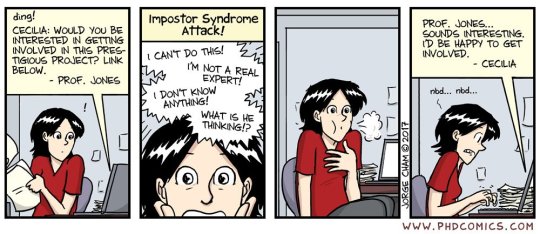
If this sounds like something you are feeling, take a breath.Allow reality to set in: You got where you are because you earned it. You areaccomplished and will continue to accomplish things. Your department believesin you and recognizes your potential, or else you wouldn’t be there. If yourcohort has more accomplishments than you (publications, fellowships,scholarships, etc), that’s fine – we all work at our own pace, to the timingthat is meant to be. Be aware of your role in your success, but stay humble atthe same time. There is only so much you can achieve in a day, month, or year,and you need to balance your ambition with your physical and mental ability andstamina.
Imposter syndrome manifested alongside severe panic attacks forme, and at the time, I was too stubborn to take the hour or so to visit aprofessional for help. If you find that you suffer from anxiety or panicattacks, I strongly recommend visiting a therapist or doctor for copingstrategies and/or medication, depending on your personal situation. (For more advice, again, see this article.)
I hope this helps! I didn’t do enough affirming of youraccomplishments in the above text – trust me, anon, you are where you are becauseyou deserve to be there. Go do great things!
104 notes
·
View notes